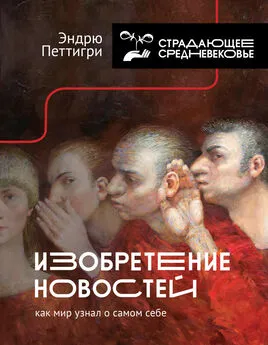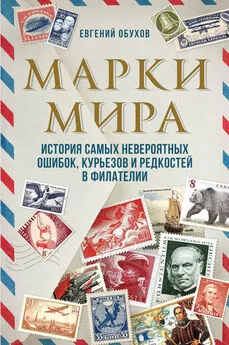Эндрю Петтигри - Изобретение новостей. Как мир узнал о самом себе
- Название:Изобретение новостей. Как мир узнал о самом себе
- Автор:
- Жанр:
- Издательство:АСТ
- Год:2021
- Город:Москва
- ISBN:978-5-17-127024-7
- Рейтинг:
- Избранное:Добавить в избранное
-
Отзывы:
-
Ваша оценка:
Эндрю Петтигри - Изобретение новостей. Как мир узнал о самом себе краткое содержание
Автор охватывает период почти в четыре века — от допечатной эры до 1800 года, от конца Средневековья до Французской революции, детально исследуя инстинкт людей к поиску новостей и стремлением быть информированными. Перед читателем открывается увлекательнейшая панорама столетий с поистине мульмедийным обменом, вобравшим в себя все доступные средства распространения новостей — разговоры и слухи, гражданские церемонии и торжества, церковные проповеди и прокламации на площадях, а с наступлением печатной эры — памфлеты, баллады, газеты и листовки. Это фундаментальная история эволюции новостей, начиная от обмена манускриптами во времена позднего Средневековья и до эры триумфа печатных СМИ.
В формате PDF A4 сохранен издательский макет.
Изобретение новостей. Как мир узнал о самом себе - читать онлайн бесплатно ознакомительный отрывок
Интервал:
Закладка:
http://www.oed.com/view/Entry/101740. J. Paul Hunter, Before Novels: The Cultural Contexts of Eighteenth-Century English Fiction (New York: Norton, 1990), pp. 167-72.
785
Weekly Journal or British Gazeteer, 12 September 1724. Michael Harris, ‘Journalism as a Profession or Trade in the Eighteenth Century’, in Robin Myers and Michael Harris (eds), Author/Publisher Relations during the Eighteenth and Nineteenth Centuries (Oxford: Oxford Polytechnic Press, 1983), p. 42.
786
The case of the coffee-men of London and Westminster (London, 1729), p. 5.
787
Flying Post or Weekly Medley, 21 December 1728; Harris, ‘Journalism’, p. 41.
788
Paula McDowell, The Women of Grubstreet: Press, Politics and Gender in the London Literary Marketplace, 1678–1730 (Oxford: Oxford University Press, 1998), pp. 55-7, 101-2.
789
Jeroen Salman, Pedlars and the Popular Press: Itinerant Distribution Networks in England and the Netherlands, 1600–1850 (Leiden: Brill, 2014).
790
Ниже, глава 16.
791
Salman, Pedlars and the Popular Press, Chapter 4.
792
Hannah Barker, Newspapers, Politics and Public Opinion in Late Eighteenth-Century England (Oxford: Oxford University Press, 1998), p. 101; Robert L. Haig, The Gazetteer, 1735–1797: A Study in the Eighteenth-Century Newspaper (Carbondale, IL: Southern Illinois University Press, 1960), pp. 178-80.
793
Peter Fraser, The Intelligence of the Secretaries of State and their Monopoly of Licensed News, 1660–1688 (Cambridge: Cambridge University Press, 1956), pp. 30-2.
794
James Ralph, The case of authors by profession or trade stated (London, 1758), pp. 22, 61-7; Harris, ‘Journalism’, pp. 37-8. http://www.oed.com/view/Entry/101739.
795
R. M. Wiles, Freshest Advices: Early Provincial Newspapers in England (Columbus, OH: Ohio State University Press, 1965), p. 192.
796
Там же.
797
Там же, с. 290–1.
798
P. M. Handover, A History of the London Gazette, 1665–1965 (London: HMSO, 1965), p. 53.
799
A. Aspinall, ‘The Social Status of Journalists at the Beginning of the Nineteenth Century’, Review of English Studies, 21 (1945), pp. 216-32.
800
J. A. Robuck in his pamphlet The London Review and the Periodical Press (London, 1835), quoted Aspinall, ‘Social Status of Journalists’, pp. 222-3.
801
Lucyle Werkmeister, A Newspaper History of England, 1792–1793 (Lincoln, NB: University of Nebraska Press, 1967), pp. 21, 35.
802
Cobbett, The Political Register, 4 January 1817, referring to his Porcupine, which closed in 1801; Aspinall, ‘Social Status of Journalists’, p. 225.
803
См. выше в главе 11.
804
Steven Shapin, A Social History of Truth: Civility and Science in Seventeenth-Century England (Chicago, IL: University of Chicago Press, 1994), pp. 65-125.
805
C. Moreau, Bibliographie des Mazarinades, 3 vols (Paris: Renouard, 1850-1), nos 1,8092,294.
806
Konstantin Dierks, In My Power: Letter Writing and Communications in Early America (Philadelphia, PA: University of Pennsylvania, 2009), pp. 206-14.
807
I. Atherton, ‘The Itch Grown a Disease: Manuscript Transmission of News in the Seventeenth Century’, Prose Studies, 21 (1998), pp. 39–65. Also available in Joad Raymond (ed.), News, Newspapers, and Society in Early Modern Britain (London: Frank Cass, 1999).
808
Data collected in Roger Chartier, ‘The Practical Impact of Writing’, in A History of Private Life. III. Passions of the Renaissance, ed. R. Chartier (Cambridge, MA: Harvard University Press, 1989), pp. 112-15.
809
Judith Rice Henderson, ‘Erasmian Ciceronians: Reformation Teachers of Letter-Writing’, Rhetorica, 10 (1992), pp. 273–302; eadem, ‘Humanism and the Humanities’, in LetterWriting Manuals, pp. 141-9; De conscribendis epistolis, ed. Charles Fantazzi, Collected Works of Erasmus, vol. 25 (Toronto: University of Toronto Press, 1985).
810
Linda C. Mitchell, ‘Letter-Writing Instruction Manuals in Seventeenth- and Eighteenth-Century England’, in Carol Poster and Linda C. Mitchell, Letter-Writing Manuals (Columbia, SC: University of South Carolina Press, 2007), pp. 179-80.
811
Roger Chartier, ‘Secretaires for the People’, in Roger Chartier, Alain Boureau and Celine Dauphin, Correspondence: Models of Letter-Writing from the Middle Ages to the Nineteenth Century (London: Polity Press, 1997), pp. 59-111.
812
Alfred Morin, Catalogue descriptive de la bibliotheque bleue de Troyes (Geneva: Droz, 1974).
813
Clare Brant, Eighteenth-Century Letters and British Culture (Basingstoke: Palgrave Macmillan, 2008).
814
The Letters of Benjamin Franklin and Jane Mecom, ed. Carl van Doren (Princeton, NJ: Princeton University Press, 1950), p. 81; David M. Henkin, The Postal Age: The Emergence of Modern Communications in Nineteenth-Century America (Chicago, IL: University of Chicago Press, 2006), p. 180, n. 10.
815
Roger Chartier, ‘An Ordinary Kind of Writing’, in Correspondence, p. 17.
816
Dierks, In My Power, pp. 25–32.
817
Там же.; Brant, Eighteenth-Century Letters, Chapter 4: ‘Writing as a Lover’.
818
Brant, Eighteenth-Century Letters,p. 172.
819
Wiles, Freshest Advices , p. 194.
820
Там же, с. 194–5.
821
Paul Friedland, Seeing Justice Done: The Age of Spectacular Capital Punishment in France (Oxford: Oxford University Press, 2012).
822
Там же, с. 156.
823
Там же, с. 168–72, 231.
824
V. A. C. Gatrell, The Hanging Tree: Execution and the English People, 1770–1868 (Oxford: Oxford University Press, 1994).
825
Выше в главе 6.
826
Michel Foucault, Discipline and Punish: The Birth of the Prison (London: Allen Lane, 1977).
827
Friedland, Seeing Justice Done, pp. 247-8.
828
G. A. Cranfield, The Development of the Provincial Newspaper, 1700–1760 (Oxford: Oxford University Press, 1962); Charles C. Clark, The Public Prints: The Newspaper in Anglo-American Culture, 1665–1740 (New York: Oxford University Press, 1994). For the French affiches (advertising journals) see Gilles Feyel, L’annonce et la nouvelle. La presse d’information en France sous l’ancien regime (1630–1788) (Oxford: Voltaire Foundation, 2000), pp. 929-1,274.
829
Arthur H. Cash, John Wilkes: The Scandalous Father of Civil Liberties (New Haven, CT: Yale University Press, 2006); Peter D. G. Thomas, John Wilkes: A Friend to Liberty (Oxford: Oxford University Press, 1996). The Briton, опубликовано в тридцати восьми выпусках с 29 мая 1762 по 12 февраля 1763, отредактирован для Бута выдающимся шотландским писателем Тобиасом Смоллеттом. http://www. oxforddnb.com/view/article/25947.
830
Cash, Wilkes, p. 79.
831
Там же, с. 85.
832
The North Briton, 45, 23 April 1763. Quoted Bob Clarke, From Grub Street to Fleet Street: An Illustrated History of English Newspapers to 1899 (Aldershot: Ashgate, 2004), p. 88.
833
Cash, Wilkes , p. 119.
834
Public Advertiser, 17 December 1769. Quoted Clarke, Grub Street, p. 90.
835
Clarke, Grub Street , p. 92.
836
Только в 1972 году парламент официально откажется от запрета на репортажи о своих дебатах.
837
Robert R. Rea, The English Press in Politics, 1760–1774 (Lincoln, NB: University of Nebraska Press, 1963), p. 5; Stephen J. A. Ward, The Invention of Journalism Ethics (Montreal: McGill University Press, 2004), p. 155.
838
The political beacon: or the life of Oliver Cromwell, impartially illustrated (London, 1770), p. 3, quoted Clare Brant, Eighteenth-Century Letters and British Culture (Basingstoke: Palgrave Macmillan, 2006), p. 176.
839
Clarke, Grub Street , p. 95.
840
This story is beautifully told by Ian Kelly, Mr Foote’s Other Leg: Comedy, Tragedy and Murder in Georgian London (Basingstoke: Picador, 2012).
841
Hannah Barker, Newspapers, Politics and Public Opinion in Late Eighteenth-Century England (Oxford: Oxford University Press, 1998).
842
A thoughtful survey is Clark, Public Prints .
843
Там же, с. 216.
844
John B. Blake, ‘The Inoculation Controversy in Boston: 1721–1722’, New England Quarterly, 25 (1952), pp. 489–506.
845
Pennsylvania Gazette, no. 1,324, 9 May 1754. Consulted in the library of the Library Company of Philadelphia.
846
The New York Gazette, the New York Mercury, the Boston Gazette and the Boston Newsletter.
847
Выше в главе 11.
848
Arthur M. Schlesinger, Prelude to Independence: The Newspaper War on Britain, 1764–1776 (New York: Knopf, 1958).
849
Clarence S. Brigham, History and Bibliography of American Newspapers, 1690–1820, 2 vols (London: Archon Books, 1962).
850
Stephen Botein, ‘Printers and the American Revolution’, in Bernard Bailyn and John B. Hench (eds), The Press and the American Revolution (Worcester, MA: American Antiquarian Society, 1980), p. 20.
851
Botein, ‘Printers’, p. 26.
Читать дальшеИнтервал:
Закладка:










